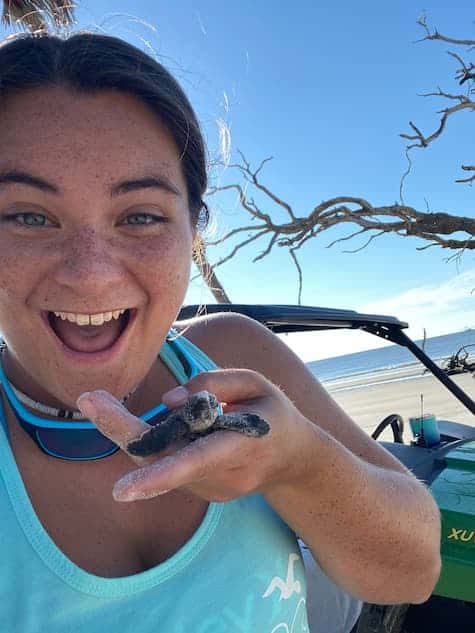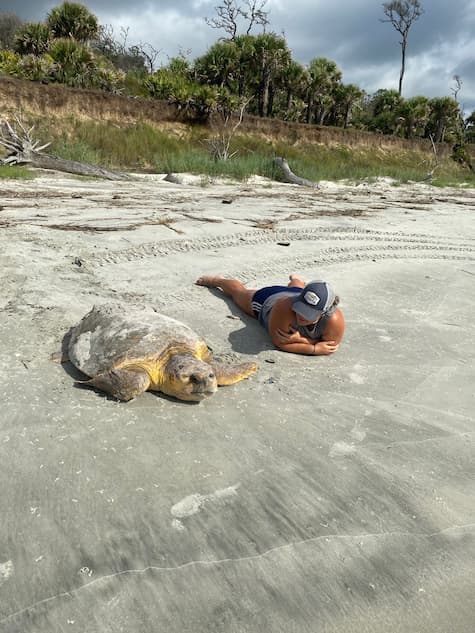Spending a summer on an island might seem like a distant dream for many college students, but for Alexandra Chapman, it became a reality following her senior year at Montreat College. While she spends plenty of time at the beach, most of her time there is spent working as an intern with the St. Catherines Island Sea Turtle Conservation Program.
“It has definitely been a once-in-a-lifetime experience,” said Chapman, who grew up in the small town of Roxboro, North Carolina, north of Durham near the Virginia border. “As a young kid, I was always fascinated with animals, and I just wanted to learn anything I could about them. Sea turtles were always a hot topic for me, but I never thought I would actually work with them. It was very much God’s timing and God’s plan of orchestrating all the steps to actually getting me here.”

Located just off the coast of Georgia, approximately 40 miles south of Savannah, St. Catherines is a ten-mile-long stretch of land varying in width from one to three miles. Its beaches serve as an ideal nesting site for sea turtles, particularly loggerheads.
“There have been cases where a green sea turtle has nested or a leatherback has nested, but a vast majority of ours are loggerheads,” Chapman said. “You can tell what species of turtle it is by the tracks that they make in the sand because each turtle does their own little walk. Loggerheads kind of alternate their flippers, and then leatherbacks are massive so you can know which ones are theirs pretty easily.”
Each morning, with times adjusted due to the tides, Chapman and her team monitor nesting activities on the beach. During the first half of the summer, the team inspects nests to ensure they haven’t been disturbed by predators. If a nest is compromised, the incident is logged and documented. The students also collect one egg from each nest for research purposes.
“We call it our sacrifice egg,” Chapman said. “We need a genetic sample from the mother to track where she’s at, where she’s laying, and how many eggs she’s laying. The only real contact that we have with the mothers is when they’re up on the beaches laying their eggs, so if we encounter an adult female, we’ll get her measurements, find out if she has a skin tag on her, and we notify the DNR for Georgia. That helps keep track of populations where they’re nesting.”
As the summer progresses, the team’s focus shifts to monitoring hatchlings. Typically, hatchlings emerge around day 60. If they haven’t hatched after 70 days, the team will dig into the nest to count the number of hatched eggs, rotten eggs, and any remaining hatchlings. If dead hatchlings are found, a flipper sample is taken to extract the father’s DNA. The study aims to determine whether eggs in a single nest may have different fathers or share the same one, adding a layer of complexity to understanding sea turtle reproduction.
Despite being depicted in movies and media as majestic creatures, Chapman has observed that sea turtles are often less than graceful in real life.
“Turtles are really goofy and dorky, honestly,” Chapman laughed. “One turtle had a tree in its way, and it hit the tree multiple times. We had another one that literally crawled right off the side of a dune with a sheer cliff side. She just flipped over and kept going. Also, turtles fling sand everywhere to fluff up their nests so you can’t tell where it is. One turtle was flinging sand, and every time she’d bring her flipper up, she’d smack herself in the face with sand. You could just see her blink the sand out of her eye and then smack herself in the face again.”

For Chapman, this summer’s internship is the latest example of God’s guidance in her life. After completing her associate’s degree at Piedmont Community College in her hometown, she knew she wanted to continue her education, but was uncertain where to go. While working at a local farm, a small joke about a coworker’s sweatshirt led to an unexpected opportunity.
“I had been to Canada with my church for mission trips, and we went to Montreal, so any time I saw her wear her Montreat sweatshirt I was like, ‘Hey, Montreal,’” she recalled. “I finally asked her about it, and she said Montreat was her college. I wanted to go to a small college in the mountains and Montreat just kept popping in my head.”
Chapman was particularly drawn to Montreat’s Outdoor Recreation Studies program with an emphasis on conservation law enforcement. After applying, she received an acceptance email within ten minutes. Soon after, she received another email from Kristen Eggert, the head coach of the women’s soccer team, inviting her to participate in an ID camp.
“I played soccer all throughout high school, but I didn’t even think about playing collegiately. Plus, I had taken two years off,” she remembered. “I was just interested in being part of the team, so I was happy to take on a manager position, but on the last day of preseason, Coach K pulled me aside and asked if I would like a spot as one of our goalkeepers. The people that I met, and the coaches I had were very much a God thing on how I got to Montreat.”
Once at Montreat, Chapman fully immersed herself in the community, cherishing the close-knit relationships she built with both her peers and professors.
“What makes Montreat different and what makes Montreat such a unique school and experience is that there’s genuine care,” she said. “Your professors genuinely take an interest in your lives. Professors would come to our games, and you could hear them in the stands cheering for their students. You’re not just another student. You’re somebody’s friend. You’re somebody’s child. They genuinely take an interest in who you are as a person, so they want to help you succeed.”
For Chapman, Montreat College prepared her for her internship in ways that went beyond academics.
“Just being at Montreat taught me how to interact with people of different backgrounds and just be very gracious. That’s helped me, especially when you’re on an island with people,” she said. “Even though Montreat was a small school, there are a lot of people that you interact with on a daily basis. There’s a beautiful community at Montreat because everybody accepts differences and they want to learn from each other.”
Since Chapman transferred to Montreat College, she wasn’t able to complete her required internship until now. As a result, she won’t officially receive her diploma until after her internship ends in September. Beyond that, she plans to return home and wait for the Lord’s direction for her next steps.
“This summer has been very satisfying to be a part of big change,” she reflected. “There’s been an increase in turtle population here, and I would like to branch out to other kinds of animals, maybe doing more conservation work rather than research, but I definitely would like to be working with animals again. I’m still torn between living at the beach or living in the mountains cause I do love both. Usually, when people ask which one I’m going to be at, I usually just say, ‘Whenever the wind stops blowing, and God says, stay here.’”